Road and sewer issues a 'time bomb' for homeowners
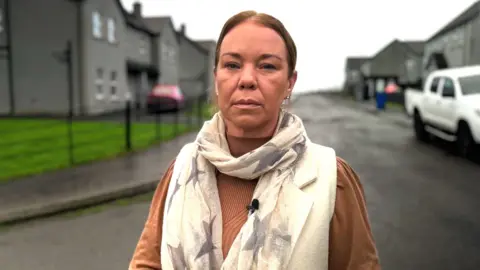 BBC
BBCThere are more than 1,800 unadopted housing developments across Northern Ireland, according to figures seen by BBC News NI.
These are developments which have been built but do not meet a standard which statuary agencies deem acceptable to be adopt and maintain the roads and sewers.
One impacted homeowner, Seana Quinn, said the unadopted part of her development looks "unsightly and unfinished" with crumbling kerbstones and potholes.
Both NI Water and the Department for Infrastructure (DfI) said any remedial works required are the responsibility of the developer.
The council area with the most unadopted developments in Mid Ulster.
Ms Quinn, from County Tyrone, said she was "completely shocked" when she found out many others were in the same situation.
BBC News NI previously reported that homes surrounded by unadopted roads and sewers are difficult to sell, and ground maintenance problems can go unresolved for years.
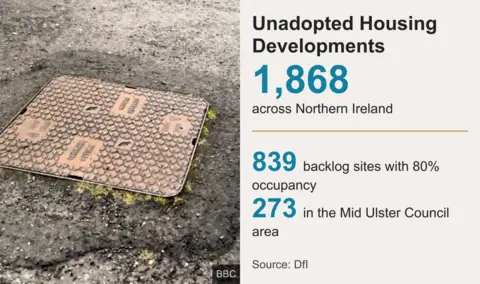
DfI said it is the responsibility of developers to provide roads and water infrastructure to an adoptable standard.
Meanwhile, NI Water said that it can offer advice but that it is not funded to "make repairs to defects left by the poor workmanship of developers".
Why do roads and sewers need to be adopted?
Solicitors will often advise a client not to proceed with the purchase of a house in an unadopted development, and banks can be reluctant to mortgage the house.
When building houses, developers are required to put down a deposit, known as a bond.
This is meant to protect the interests of buyers by providing a source of funding to allow the government to complete the roads and sewers to an adoptable standard when the developer has failed to do so.
But in some cases of unadopted developments, the value of the bond is not enough to cover the cost of extensive repair works needed to bring it to an adoptable standard.
Concerns are being raised about what homeowners do when the money put up by developers will not cover the repairs or they have gone bankrupt.
DfI said it has recently increased bond calculation rates and is seeking to fill vacancies within the private streets staffing structure.
It is also considering increasing private street fees to "fund a more proactive approach to inspection and management of the adoption process".
'Unable to sell houses'

Conal McGarrity, a solicitor who represents a group of affected residents, described the problem as "a ticking time bomb" that needs to be addressed.
"It's been a build-up of failures to properly regulate this issue for decades, to the point now where thousands of homeowners are left with a defective legal title and are unable to sell their houses," he said.
"You have people with their life savings invested in these properties, and there's currently no long-term solution, so it's a very serious public interest issue."
Mr McGarrity has issued judicial review proceedings against DfI.
One of the developments the solicitor has called on DfI to adopt is Hunter's Mill in Downpatrick.

Darren Kearney, a Hunter's Mill resident, said it was having a "huge affect" on his life.
"To be honest, things have been getting worse because some of the land is deteriorating to the point where the ground is sinking and falling away from the house," he said.
In a statement, NI Water said it "empathised" with residents of Hunter's Mill but that fixing the problem was a matter for the developer.
The company behind the development went financially insolvent after the houses were built in 2000.
A spokesperson for DfI said it had received "a pre-action protocol letter in relation to the Hunter's Mill development and this is currently being considered".
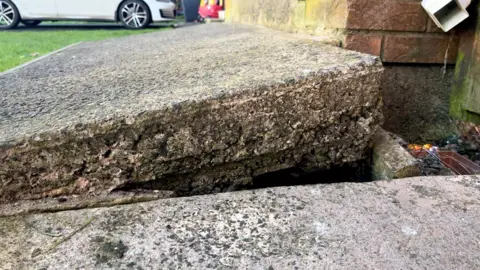
Kildrum in Galbally, County Tyrone, is one of hundreds of unadopted developments in Mid Ulster.
Some residents said they feel left in limbo as part of the development remains unadopted.
Ms Quinn has lived there for more than 20 years said: "It's unfair when people have invested so much money into their family homes."
DfI say it is the responsibility of the developer to bring Kildrum "up to an adoptable standard".
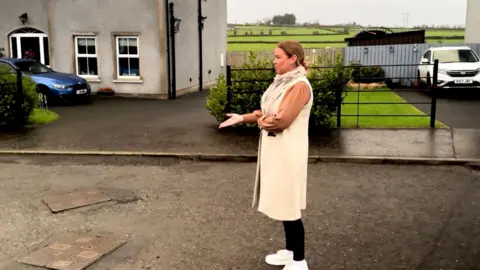
A department spokesperson added that in November 2024 it told the developer if they fail to take action, the department would "undertake the necessary remedial works and draw down the funds from the associated bond".
Since it was built, Kildrum has had a number of different developers.
The current developer was unavailable for comment.
Ms Quinn added: "We certainly never thought all these years later it would still be unresolved; there really should be stricter rules or regulations to protect homeowners."
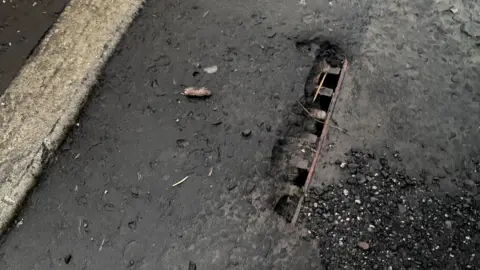
Deborah Erskine from the Democratic Unionist Party (DUP) is working on a private members bill at Stormont that she hopes will offer homeowners more protection.
"Living in an unadopted development can be a very stressful situation and I think DfI should take on more responsibility to help people in this dreadful situation," she told BBC News NI.
The Fermanagh and South Tyrone MLA has firsthand experience of the issue as she lives in a housing development that is unadopted.
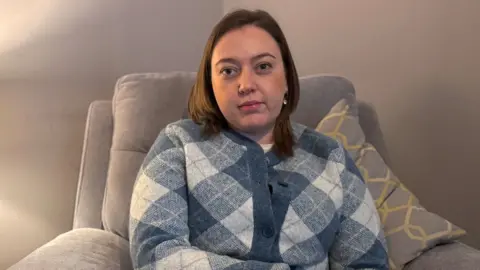
She added: "I actually think it gives me a good starting block to know the human cost of this issue on the thousands of people impacted by it.
"Some people might not even know they're living in unadopted developments, but when things like potholes or water issues arise, that's when the problems can start, so this needs highlighted and looked at."
A spokesperson for DfI said it is developing new enforcement guidelines to deal with developers that "have not fulfilled their responsibility to provide infrastructure to an adoptable standard".
